- Home
- Wendell Berry
Fidelity Page 4
Fidelity Read online
Page 4
“I reckon,” Beater said, checking his figures.
“They’re going to keep on until they shoot somebody who don’t deserve it.”
Beater looked at him then over the tops of his glasses. “Well, they’ll have to look around outside town to find somebody, won’t they?” He filled out a check for the amount of the bill and handed the check to Jack for him to sign.
And then someone who had just stepped out of the store stepped back in again and said, “Jack, you’d better come. They’ve shot Ben Feltner.”
Jack never signed the check that day or for several days. He ran to the door. When he was outside, he saw first the crowd and then Mat running toward him out of it. Without breaking his own stride, he caught Mat and held him.
They were both moving at some speed, and the crowd heard the shock of the impact as the two men came together. Jack could hardly have known what he was doing. He had had no time to think. He may have been moved by an impulse simply to stop things until he could think. Or perhaps he knew by the look on Mat’s face that he had to be obstructed. At any rate, as soon as Jack had taken hold of Mat, he understood that he had to hold him. And he knew that he had never taken hold of any such thing before. He had caught Mat in a sideways hug that clamped his arms to his sides. Jack’s sole task was to keep Mat from freeing his arms. But Mat was little more than half Jack’s age; he was in the prime of his strength. And now he twisted and strained with the concentration of fury, uttering cries that could have been either grunts or sobs, forcing Jack both to hold him and to hold him up. They strove there a long time, heaving and staggering, hardly moving from the tracks they had stood in when they came together, and the dust rose up around them. Jack felt that his arms would pull apart at the joints. He ached afterward. Something went out of him that day, and he was not the same again.
And what went out of Jack came into Mat. Or so it seemed, for in that desperate embrace he became a stronger man than he had been. A strength came into him that held his grief and his anger as Jack had held him. And Jack knew of the coming of this strength, not because it enabled Mat to break free but because it enabled Jack to turn him loose. Mat ceased to strive, and Jack let go his hold. He stepped away, allowing himself to be recognized, and Mat stood. To Jack, it was as though he had caught one man and let another go.
But he put his eye on Mat, not willing yet to trust him entirely to himself, and waited.
They both were winded, wet with sweat, and for a moment they only breathed, watched by the crowd, Jack watching Mat, Mat looking at nothing.
As they stood so, the girl, Martha Elizabeth, walked by in the road. She did not look at them or at the wagon or at the body crumpled on the ground. She walked past it all, looking ahead, as if she already saw what she was walking toward.
Coming aware that Jack was waiting on him, Mat looked up; he met Jack’s gaze. He said, “Pa’s dead. Thad Coulter has shot him.”
They waited, looking at each other still, while the earth shook under them.
Mat said, “I’ll go tell Ma. You bring Pa, but give me a little time.”
Dinner was ready, and the men were late.
“It wasn’t usual for them to be late,” my grandmother said, “but we didn’t think yet that anything was wrong. Your mother was just a little girl then, and she was telling us a story about a doll and a dog and a horse.”
Aunt Cass stood by the stove, keeping an eye on the griddle. Nancy was sweeping the floor under the firebox of the stove; she was a woman who was always doing. Margaret, having set the table, had turned one of the chairs out into the floor and sat down. All three were listening to Bess, who presently stopped her story, rolled her eyes, and said, “I hear my innards a-growling. I reckon I must be hungry.”
They laughed.
“I spect so, I spect so,” Aunt Cass said. “Well, you’ll get something to eat fore long.”
When she heard Mat at the kitchen door, Aunt Cass said, “Miss Nancy, you want to take the hoecake up?” And then seeing the change in Mat’s face, which was new to it but old to the world, she hushed and stood still.
Nancy, seeing the expression on Cass’s face, turned to look at Mat.
Bess said, “Goody! Now we can eat!”
Mat looked at his mother and then down at Bess and smiled. “You can eat directly,” he said.
And then he said, “Margaret, take Bess and go upstairs. I think she’s got a book up there she wants you to read to her.”
“I knew what it was then,” my grandmother said. “Oh, I felt it go all over me before I knew it in my mind. I just wanted to crawl away. But I had your mother to think about. You always have somebody to think about, and it’s a blessing.”
She said, “Come on, Bess, let’s go read a story. We’ll eat in a little bit.”
As soon as he heard their footsteps going up the stairs, Mat looked at his mother again. As the silence gathered against him, he said, “Ma, I’m sorry, Pa’s dead. Thad Coulter has shot him.”
She was already wearing black. She had borne four children and raised one. Two of her children she had buried in the same week of a diphtheria epidemic, of which she had nearly died herself. After the third child had died, she never wore colors again. It was not that she chose to be ostentatiously bereaved. She could not have chosen to be ostentatious about anything. She was, in fact, a woman possessed of a strong native cheerfulness. And yet she had accepted a certain darkness that she had lived in too intimately to deny.
She stood, looking at Mat, while she steadied herself and steadied the room around her, in the quiet that, having suddenly begun there, would not end for a long time.
And then she said to Mat, “Sit down.”
She said, “Cass, sit down.”
They turned chairs away from the table and sat down, and then she did.
“Now,” she said, “I want to know what happened.”
In the quiet Mat told as much, as little, as he knew.
As if to exert herself against the silence that too quickly filled the room, Nancy stood again. She laid her hand on the shoulder of Mat’s wet shirt and patted it once.
“Cass,” she said, “we mustn’t cry,” though there were tears on her own face.
“Mat,” she said, “go get Smoke and Samp and Joe. Tell them, and tell them to come here.”
To Aunt Cass again, she said, “We must fix the bed. They’ll need a place to lay him.”
And then they heard the burdened footsteps at the door.
In his cresting anger in the minutes before he stopped the mule in the road in Port William and fired the one shot that he ever fired in anger in his life, Thad Coulter knew a fierce, fulfilling joy. He saw the shot home to the mark, saw Ben Feltner stand a moment and go down, and then he heeled the mule hard in the side and rode on. He went on because all behind him that he might once have turned back to was gone from his mind, and perhaps even in his joy he knew that from that time there was to be no going back.
Even before the town was out of sight behind him, his anger and his joy began to leave him. It was as if his life’s blood were running out of him, and he tried to stanch the flow by muttering aloud the curses of his rage. But they had no force, and his depletion continued.
His first thought beyond his anger was of the mule. She was thirsty, he knew, and he had denied her a drink.
“When we get to the creek,” he said.
The mule followed the windings of the road down off the upland. Below the cleared ridges, they passed through woods. On the gentler open slopes below, they came into the blank sunlight again, and he could see the river winding between its wooded banks toward its meeting with the Ohio at Hargrave.
At the foot of the hill, the road dipped under trees again and forded a creek. Thad rode the mule into the pool above the ford, loosened the rein, and let her drink. It was a quiet, deeply shaded place, the water unrippled until the mule stepped into it. For the first time in three days Thad could hear the quiet,
and a bottomless sorrow opened in him, causing him suddenly to clutch his belly and groan aloud.
When the mule had finished drinking, he rode her out of the pool, dismounted, and, unbuckling one end of the rein from the bit, led her into a clump of bushes and tall weeds and tied her there. For now the thought of pursuit had come to him, and he knew he would have to go the rest of the way on foot. The mule could not be hurried, and she would be difficult to hide.
He went back to the pool and knelt at the edge of it and drank, and then he washed his hands and in his cupped hands lifted the clear water time and again to his face.
Presently, he became still, listening. He could hear nothing but the cicadas in the surrounding trees. And then he heard, coming fast, the sound of loud talking and the rapid hooftread of horses. He stepped into a patch of weeds and watched several riders go by on the road. They were boys and young men from the town who, having waited through the aftermath of the shooting, had now been carried by their excitement into pursuit of him. “Boys,” he thought. He felt in no danger from them—he did not think of the pistol—and yet he feared them. He imagined himself hurrying on foot along the road, while the young riders picked and pecked at him.
The quiet returned, and he could feel, as if in the hair roots and pores of his skin, that Martha Elizabeth was coming near. He went back to the road again.
The walking and the water drying on his face cleared his mind, and now he knew himself as he had been and as he was and knew that he was changed beyond unchanging into something he did not love. Now that his anger had drained away, his body seemed to him not only to be a burden almost too heavy to carry but to be on the verge of caving in. He walked with one hand pressed to his belly where the collapse seemed already to have begun.
The best way between Port William and Hargrave was still the river. The road found its way as if by guess, bent this way and that by the whims of topography and the convenience of landowners. At intervals, it was interrupted by farm gates.
After a while, hearing several more horses coming behind him, he stepped out of the road and lay down in a small canebrake. When they had passed, he returned to the road and went on. Always he was watchful of the houses he passed, but he stayed in the road. If he was to protect the one choice of which he was still master, he had to hurry.
And now, as he had not been able to do when he left it, he could see his farm. It shone in his mind as if inwardly lighted in the darkness that now surrounded both him and it. He could see it with the morning sun dew-bright on the woods and the sloping pastures, on the little croplands on the ridge and in the bottoms along the creek. He could see its cool shadows stretching out in the evening and the milk cows coming down the path to the barn. It was irrevocably behind him now, as if a great sword had fallen between him and it.
He was slow and small on the long road. The sun was slow overhead. The air was heavy and unmoving. He watched the steady stepping of his feet, the road going backward beneath them. He had to get out of the road only twice again: once for a family in a spring wagon coming up from Hargrave and once for another horse and rider coming down from Port William. Except for those, nothing moved in the still heat but himself. Except for the cicadas, the only sounds he heard were his own steady footfalls on the dry dust.
He seemed to see always not only the changing road beneath his feet but also that other world in which he had lived, now lighted in the dark behind him, and it came to him that on that day two lives had ended for a possibility that never had existed: for Abner Coulter’s mounting up in a better place. And he felt the emptiness open wider in him and again heard himself groan. He wondered, so great was the pain of that emptiness, that he did not weep, but it exceeded weeping as it exceeded words. Beyond the scope of one man’s grief, it cried out in the air around him, as if in that day’s hot light the trees and the fields and the dust of the road all grieved. An inward pressure that had given his body its shape seemed to have been withdrawn, and he walked, holding himself, resisting step by step the urge to bend around the emptiness opening in his middle and let himself fall.
Where the valley began to widen toward the river’s mouth, the road passed a large bottom planted in corn. Thad looked back, expecting that he would see Martha Elizabeth, and he did see her. She was maybe three-quarters of a mile behind him, small in the distance, and the heat rising off the field shimmered and shook between them, but he knew her. He walked faster, and he did not look back again. It seemed to him that she knew everything he knew, and loved him anyhow. She loved him, minute by minute, not only as he had been but as he had become. It was a wonderful and a fearful thing to him that he had caused such a love for himself to come into the world and then had failed it. He could not have bowed low enough before it and remained above ground. He could not bear to think of it. But he knew that she walked behind him—balanced across the distance, in the same hot light, the same darkness, the same crying air—ever at the same speed that he walked.
Finally he came to the cluster of houses at Ellville, at the end of the bridge, and went across into Hargrave. From the bridge to the courthouse, he went ever deeper into the Saturday crowd, but he did not alter his gait or look at anybody. If anybody looked at him, he did not know it. At the cross streets, he could see on the river a towboat pushing a line of barges slowly upstream, black smoke gushing from its stacks. The walks were full of people, and the streets were full of buggies and wagons. He crossed the courthouse yard where people sat on benches or stood talking in little groups under the shade trees. It seemed to him that he walked in a world from which he had departed.
When he went through the front door of the courthouse into the sudden cool darkness of the hallway, he could not see. Lights swam in his eyes in the dark, and he had to prop himself against the wall. The place smelled of old paper and tobacco and of human beings, washed and unwashed. When he could see again, he walked to a door under a sign that said “Sheriff’’ and went in. It was a tall room lighted by two tall windows. There was a row of chairs for people to wait in, and several spittoons, placed at the presumed convenience of spitters, that had been as much missed as hit. No one was there but a large man in a broad-brimmed straw hat and a suit somewhat too small, who was standing behind a high desk, writing something. At first he did not look up. When he finally did look up, he stared at Thad for some time, as if not sufficiently convinced of what he saw.
“In a minute,” he said, and looked down again and finished what he was writing. There was a badge pinned lopsidedly to the pocket of his shirt, and he held an unlit cigar like another pen in his left hand. He said as he wrote, “You been drove hard and put up wet, I reckon.”
“Yes,” Thad said. “I have killed a man.”
The sheriff laid the pen on the blotter and looked up.
“Who?”
Thad said, “Ben Feltner, the best friend I ever had.” His eyes suddenly brimmed with tears, but they did not fall. He made no sound and he did not move.
“You’re a Coulter, ain’t you? From up about Port William?”
“Thad,” Thad said.
The sheriff would have preferred that Thad had remained a fugitive. He did not want a self-confessed murderer on his hands—especially not one fresh from a Saturday killing in Port William. He knew Ben Feltner, knew he was liked, and feared there would be a commotion. Port William, as far as he was concerned, was nothing but trouble, almost beyond the law’s reach and certainly beyond its convenience—a source, as far as he was concerned, of never foreseeable bad news. He did not know what would come next, but he thought that something would, and he did not approve of it.
“I wish to hell,” he said, “that everybody up there who is going to kill each other would just by God go ahead and do it.” He looked at Thad for some time in silence, as if giving him an opportunity to disappear.
“Well,” he said, finally, “I reckon you just as well give me the pistol.”
He gestured toward Thad’s sagging hip pocket,
and Thad took out the pistol and gave it to him.
“Come on,” the sheriff said.
Thad followed him out a rear door into the small paved yard of the jail, where the sheriff rang for the jailer.
The sheriff had hardly got back into the office and taken up his work again when a motion in the doorway alerted him. He looked up and saw a big red-faced girl standing just outside the door as if uncertain whether or not it was lawful to enter. She wore a sunbonnet, a faded blue dress that reached to her ankles, and an apron. Though she was obviously timid and unused to public places, she returned his look with perfect candor.
“Come in,” he said.
She crossed the threshold and again stopped.
“What can I do for you, miss?”
“I’m a-looking for Mr. Thad Coulter from up to Port William, please, sir.”
“You his daughter?”
“Yes, sir.”
“Well, he’s here. I got him locked up. He claims he killed a fellow.”
“He did,” the girl said. “Is it allowed to see him?”
“Not now,” the sheriff said. “You come back in the morning, miss. You can see him then.”
She stood looking at him another moment, as if to make sure that he had said what he meant, and then she said, “Well, I thank you,” and went out.
An hour or so later, when he shut the office and started home to supper, she was sitting on the end of one of the benches under the shade trees, looking down at her hands in her lap.
“You see,” my grandmother said, “there are two deaths in this—Mr. Feltner’s and Thad Coulter’s. We know Mr. Feltner’s because we had to know it. It was ours. That we know Thad’s is because of Martha Elizabeth. The Martha Elizabeth you know.”
I knew her, but it came strange to me now to think of her—to be asked to see her—as a girl. She was what I considered an old woman when I first remember her; she was perhaps eight or ten years younger than my grandmother, the fire red long gone from her hair. She was a woman always near to smiling, sometimes to laughter. Her face, it seemed, had been made to smile. It was a face that assented wholly to the being of whatever and whomever she looked at. She had gone with her father to the world’s edge and had come back with this smile on her face. Miss Martha Elizabeth, we younger ones called her. Everybody loved her.

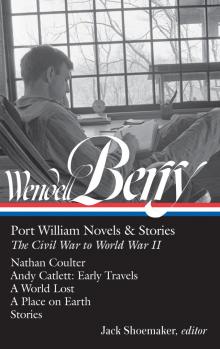 The Selected Poems of Wendell Berry
The Selected Poems of Wendell Berry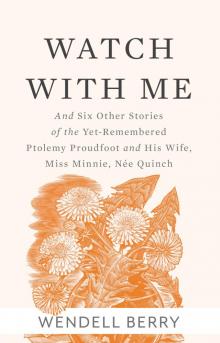 Watch With Me
Watch With Me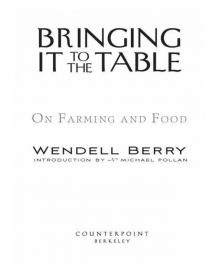 Bringing It to the Table: On Farming and Food
Bringing It to the Table: On Farming and Food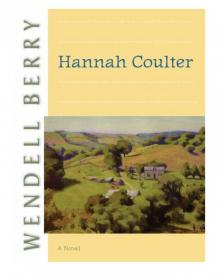 Hannah Coulter
Hannah Coulter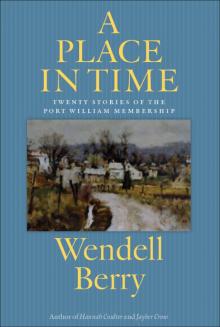 A Place in Time: Twenty Stories of the Port William Membership
A Place in Time: Twenty Stories of the Port William Membership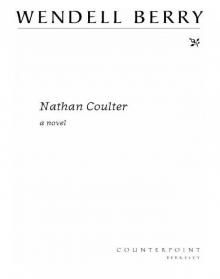 Nathan Coulter
Nathan Coulter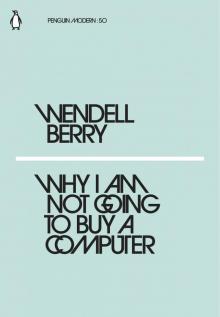 Why I Am Not Going to Buy a Computer
Why I Am Not Going to Buy a Computer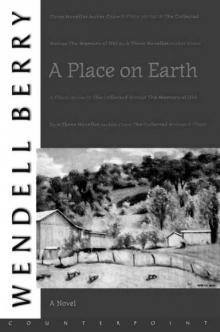 A Place on Earth
A Place on Earth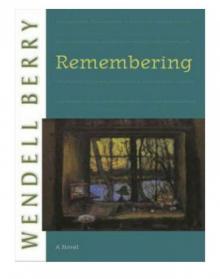 Remembering
Remembering New Collected Poems
New Collected Poems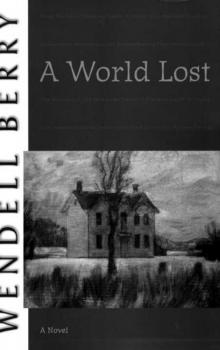 A World Lost
A World Lost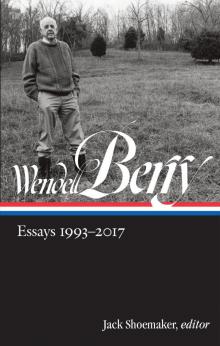 Wendell Berry
Wendell Berry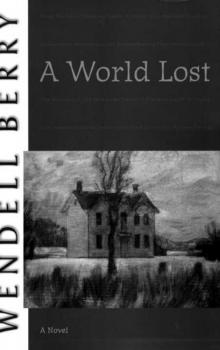 A World Lost: A Novel (Port William)
A World Lost: A Novel (Port William)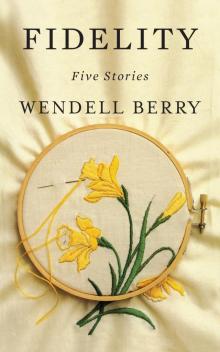 Fidelity
Fidelity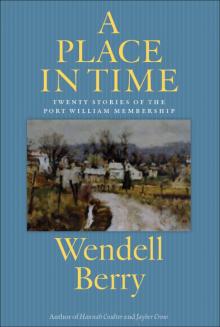 A Place in Time
A Place in Time